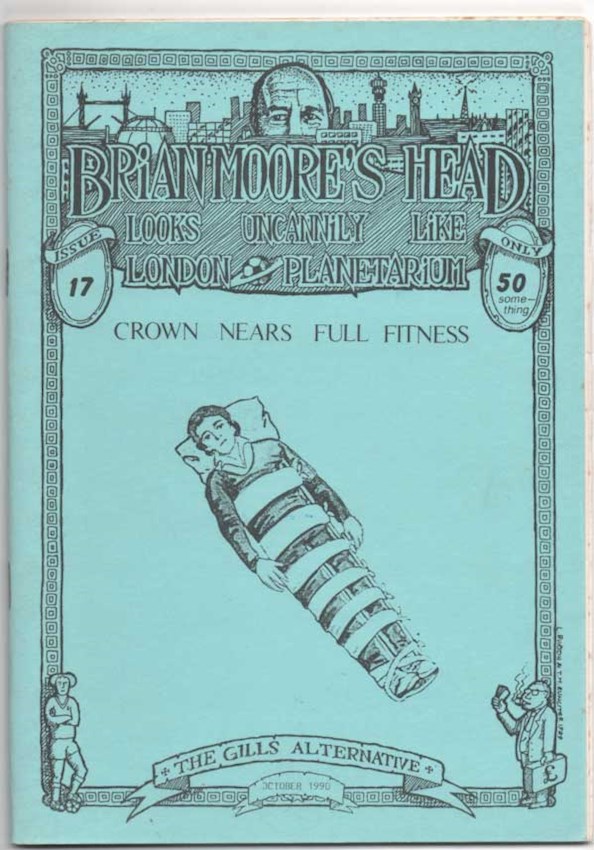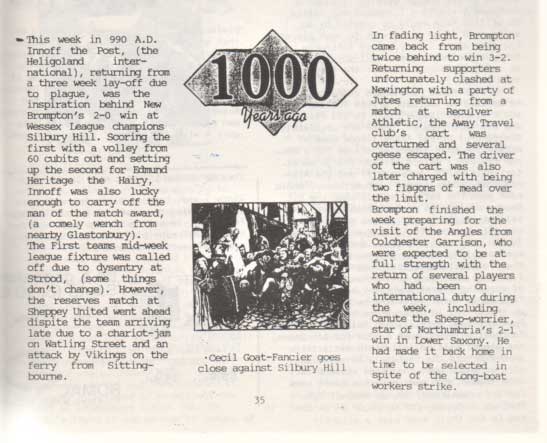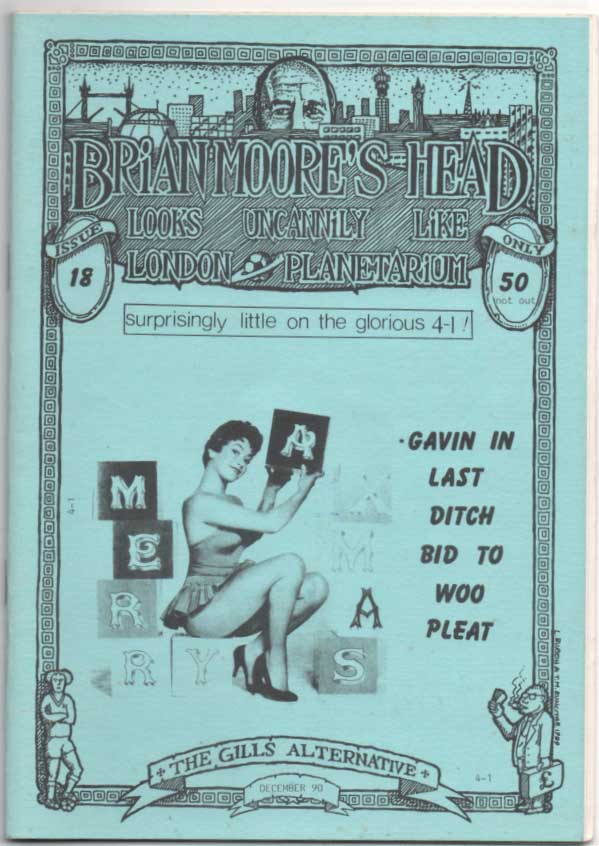One of the major challenges of producing Brian Moore’s Head was trying to come up with something good, preferably humorous, to go on the front cover.
It wasn’t just a case of having a decent idea as, in the pre-internet days of the publication’s formative years, it was often difficult to source a picture to go with the undoubtedly witty heading. BMH17, dated October 1990, was one of those occasions when we got lucky.
Forward David Crown had joined the Gills from Southend the previous summer but had subsequently missed the first few weeks of the 1990-91 season through injury. Needing a decent illustration to accompany ‘Crown nears full fitness’, we hit the jackpot, thanks to a bizarre source.
We hadn’t thought that we could do any better than to have a picture of someone who looked injured, but, courtesy of an illustration from a first aid manual that one of my work colleagues had, we got a picture of someone who looked suitably injured but also bore more than a passing resemblance to Mr Crown.

It is fair to say that, at the time, Crown was not exactly the Head’s favourite player. BMH5 in February 1989, some twenty months earlier, included the contents of a letter that one of the editorial team had sent to the-then Southend player-manager Paul Clark (who later played for the Gills) on 16 October 1988, the day after Gillingham had played the Essex club at Roots Hall, ‘I must strongly complain about the behaviour of one of your players during last Saturday’s game. After taking the penalty, Dave Crown ran towards the Gills fans, making offensive V-signs with both hands. This disgusting display could easily have led to a nasty incident, were it not for the good manners and behaviour of our own fans (unlike those of this player). If I had made such a gesture, I’m sure that the Police would have had no hesitation in removing me from the ground. Our supporters did draw the Police’s attention to the incident and I hope that they have taken appropriate action (as I hope you will). In the meantime, I suggest that you remind certain of your players that, in future, they show some respect for other fans.’
With no reply received, a further letter was duly despatched in the direction of the Southend boss, ‘I would be interested to hear how this matter was resolved and would appreciate an answer to my letter.’ Again, no response.
BMH6, dated March 1989, referred to the return match against the Essex side, played at Priestfield in the February, ‘It has not gone un-noticed that David Crown has been up to his old tricks again – i.e. making provocative gestures to the Gills fans following his goal.’ This time, letters were fired off to the Football Association and Southend. Both were replied to, with the FA stating that they had ‘written to Mr. Crown a suitable letter of advice’, whilst new Shrimpers boss David Webb wrote, ‘I can assure you that, like any decent football person, neither myself or, I am sure, David Crown, wish to incite or abuse opposition supporters. Please accept our apologies if, in fact, you felt offended by such gestures from Mr. Crown, whom I have made aware of your letter.’
Crown’s arrival as a Gillingham player merited comment in BMH15 at the start of 90-1, ‘You go on holiday for a couple of months and what happens? The club are merrily signing a totally despised opponent. I know BMH have had several words to say on the subject of David ‘Fingers’ Crown in the past (none of them particularly complimentary), but there is no mileage to be gained by waging a vendetta against him now that he is a Gills man.’ The truce obviously didn’t extend to the striker gaining immunity from receiving stick in the fanzine, as evidenced by BMH17’s cover alluding to his continuing lack of fitness, and a piece inside the same edition that included the following, underneath a picture of the player, ‘I’m reliably informed that this is a picture of David Crown, taken while he was at Reading. Rumours of him signing for the Gills are yet to be proved by the sight of him actually playing a game.’
Crown finally made his debut as a substitute in the 2-0 home defeat against Maidstone United on 22 September 1990, with his fourteen goals during the remainder of the campaign no doubt going a long way towards helping fans banish his previous misdemeanours from their memory.
Issue seventeen reproduced a cartoon strip from the mid-Eighties that appeared in football publication Match Weekly. ‘Cannon’ followed the fortunes of a fictitious footballer who played for Stanton, a team that was in division three. To add a dose of reality, Stanton were the only made up club, the rest of division three comprising real teams. The strip featured Stanton’s meeting with the Gills. On a poor pitch, David Mehmet put us 1-0 up before conditions deteriorated, ‘As the snowfall intensifies, the players find it difficult even to see the ball – never mind control it!’.
In the end, the ‘referee has no alternative to abandon the game.’ BMH commented, ‘What a blooming swiz. A little bit of snow and they’re all chickening out, just because we were going to win. Strangely enough, the replayed match was never covered in the strip, so the result is unknown, although it could surely be argued that the loss of these three certain points could well have gone a long way to costing us promotion in 84-5.’ The fanzine didn’t name and shame the person who obviously had kept years-old back copies of Match Weekly.
An article on striker Danny Westwood’s time at Gillingham (he was with us for just over six years from November 1975) mentioned the love-hate relationship he had with the Rainham Enders towards the end of his spell with us, with the fans wanting him back every time he was out of the side, and out when he was in. The feature included, ‘One incident in particular sticks in my mind, where a typical run by the fleet-footed striker (as he was always described in the pen pictures in away match programmes) ended with a shot over the bar. This was the cue for a spot of Rainham End abuse, and the protagonists were rewarded with a bold gesture from Danny which suggested that perhaps their sex lives were not all they might be.’

Westwood read the piece and took the time and trouble to write to the fanzine, with his letter printed in BMH 18, ‘I was both pleased and flattered to be the subject of one of your articles. Reading through it conjured up special memories of my time at the Gills. The players and fans were a super bunch on the whole. I remember vividly the incident with the crowd to which you referred and I would like to put my side of the story. It was, I believe, against Carlisle, and, after the howling miss, I scored and then asked to be substituted due to a knee injury. This was found to be the worsening of a cyst on the cartilage and I went into Medway Hospital on the following Monday for an operation. I am not excusing totally my act of petulance, but I was in a lot of pain and this added to my frustration. Overall, I like to think I was appreciated and enjoyed a good rapport with the crowd. Thanks for your profile on me, and for the memories.’
Issue eighteen also cast a look back at the three-wheeled light blue cars for disabled supporters that were prominent at our home matches during the seventies and eighties. There were usually two or three at each game, parked between the terraces and the pitch in the corner of the Town End and Gordon Road side - ‘Just as the fanfare that greeted the arrival of the Gills onto the pitch began, the first invalid car would zoom into the ground and tear around the asphalt perimeter track, before coming to a halt near the corner flag, just in front of where I stood, closely followed by one or two more.
There were many occasions when us mere terrace mortals gazed enviously at the cars’ occupants, each sitting in a warm vehicle with a tartan blanket over their legs, whilst the rest of us jumped up and down trying to get the blood circulating around the body on a bitterly cold day, or attempted to shelter from a torrential downpour.’ The author wrote that, on one occasion, he thought he had witnessed a miracle, with one man getting out of his invalid car at half-time, walking rather spritely to the tea bar in the Main Stand before strolling back with his cuppa, showing no sign of any disability, ‘Maybe he was able-bodied and had borrowed a disabled friend’s car so he could watch Gills in more comfort than he’d experience on the terraces. If this was so, it was a good job the idea didn’t catch on, I mean, 4,000 Gillingham fans turning up at Priestfield at five to three, all in invalid cars, could have caused rather serious traffic congestion problems.’
At full-time, the disabled drivers were always keen on a quick getaway, ‘The final whistle signalled the end of the entertainment on the pitch but, down on the perimeter track, things were just hotting up. As soon as the referee ended the games, the invalid cars, with engines nicely revved up, would tear round the track to try and get out of the ground first. The drivers took no prisoners, cut each other up and even took short cuts across the corner of the pitch in an attempt to get out first.’
After the ‘Cannon’ cartoon strip in issue seventeen, Match Weekly featured again in the next edition of BMH, with their news story that ‘Gillingham were struck by a phantom kit-nicker, days before their game against Hartlepool in the fourth division. Fortunately, the thief wasn’t too happy with his haul and promptly returned the strip, insisting he couldn’t flog it to a dead horse.’ It seems that Match were the victims of a hoax as a later issue contained, ‘Apologies to Gillingham FC. We inadvertently stated that the Gills had their kit stolen. A spokesman for the club said that this was not the case. Apologies to all concerned.’
The BMH-run Kelvin Morton Fan Club had certainly taken off since its launch at the start of the 1990-91 season, with issue eighteen of the fanzine reporting that it now boasted as many as eight members. The legendary referee had been up to his old tricks again, with the same edition including a cutting from a match report in the Sunday People newspaper, ‘Fulham’s 3-2 win over Exeter boasted the season’s most bizarre dismissal when referee Kelvin Morton sent off a substitute who wasn’t even playing. Exeter’s Ben Rowe dashed on to the Craven Cottage pitch to protest at Fulham’s second goal, scored by an offside-looking Davies. The ref spoke to Rowe on the touchline and showed him the red card.’
However, BMH were all for balanced journalism, with the same issue including a letter, under the heading ‘Kelvin has good game shock.’ Morton had taken charge of the Arsenal v Chester Rumbelows (League) Cup tie, with the writer fully expecting ‘a stormy night, with at least one sending off, half a dozen bookings and a few penalties thrown in for good measure. Unfortunately, I was bitterly disappointed, as moments of controversy were few and far between. This was probably one of the most restrained performances in Kelvin’s career to date.’
The back page announced the imminent return of our favourite ref, with Morton due to take charge of our home game against Northampton on 29 December 1990, ‘An occasion for the whole family, come and join in with all your favourite chants, “There’s only one Kelvin Morton” and “Kelvin, Kelvin, give us a wave”’.
From issue seventeen, the reproduction of photos in the fanzine improved greatly, making it look more professional, and the printers, Juma of Sheffield, were duly thanked in the information column of BMH18.
We were still breaking up the articles with a significant number of celebrity pictures, with those featured in issue eighteen including the pop group Sparks, George Cole in his role as Minder’s Arthur Daley, and singing sisters, The Nolans. The editorial in the same edition evidenced the change in mindset towards David Crown, ‘Fingers has the ability to run at opposing defenders, thus creating space that others can exploit. The partnership between him and Steve Lovell is showing signs of becoming a great one, and one can only imagine where we would be in the table had they both been fit from day one.’
The editorial ended, somewhat optimistically as it turned out, with, ‘With a bit of luck, there is no reason why we cannot begin to climb the table and challenge for promotion come May.’ BMH18 was dated December 1990, at the start of that month the Gills were fifteenth in the fourth division table, the exact position they finished at the end of the season.
